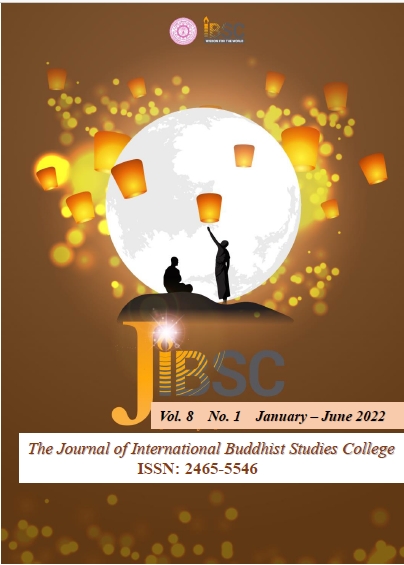THe Origin and Development of the Four Foundations of Mindfulness in China
Main Article Content
Abstract
This article delves into the origin and development of the Four Foundations of Mindfulness (Satipaṭṭhāna) within the Chinese Buddhist tradition. The Four Foundations of Mindfulness—mindfulness of the body, feelings, mind, and mental objects—constitute a central practice in Theravāda Buddhism, introduced through the Satipaṭṭhāna Sutta. The integration and evolution of these practices within Chinese Buddhism, particularly through the influences of Mahāyāna and Chan (Zen) traditions, present a unique confluence of doctrinal and practical transformations. This study traces the historical journey of these foundations from their introduction into China during the Han Dynasty through the Silk Road to their adaptation and re-interpretation by Chinese Buddhist scholars and practitioners during the Wei, Jin, and Southern and Northern Dynasties (A.D. 220 – 589). By examining primary sources, commentarial literature, and contemporary practices, this article elucidates the dynamic processes that have shaped the Four Foundations of Mindfulness in the Chinese context, highlighting their enduring significance in promoting mental clarity, ethical conduct, and spiritual awakening. The discussion is framed around three key issues: 1) The Background of the Politics and Culture of the Period of Wei Jin in China; 2) The Origin and Development of the Four Foundations of Mindfulness in China; and 3) Translation of the Scriptures about Four Foundations of Mindfulness in Early China.
Article Details
The Journal of TCI is licensed under a Creative Commons Attribution-NonCommercial-NoDerivatives 4.0 International (CC BY-NC-ND 4.0) licence unless otherwise stated. Please read our Policies page for more information on Open Access, copyright and permissions.
References
E. Zürcher. The Buddhism Conquest of China. 3rd ed. Koninklijke Brill Leiden:Hotei Publishing, IDC Publisher, 2007.
安士高 “佛說大安般守意經”大正新脩大藏經 冊15 No. 0602。 中華台北, Chinese Buddhist Text Electronic Association,2018.
李聃 道德經 北京 中國文聯出版社 2016.10
釋慧皎 “高僧傳”Gao Seng Zhuan, 大正新脩大藏經 冊50 No. 2059。中華台北, Chinese Buddhist Text Electronic Association,2018.
鐮田茂雄,中國佛教通史 The Buddhist history of China,關世謙 等譯 台灣:佛光書局 2010年.
Jing Hui. The Gate of Chan Buddhism. Tr. by Lin Ronghui. Bei jing: Sheng huo Chan wen hua ji jin hui Press, 2019.


